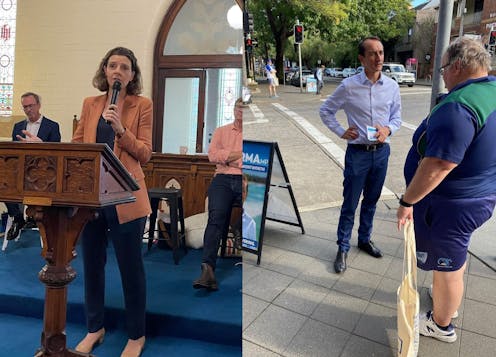The Wentworth Project: Allegra Spender's profile rises, but polarises
- Written by Michelle Grattan, Professorial Fellow, University of Canberra

At the campaign’s halfway point in the highly contested seat of Wentworth, ‘teal’ candidate Allegra Spender has shifted - but polarised - soft voters’ views about her.
Fewer of these voters have changed their opinion of her Liberal opponent, sitting member Dave Sharma. But of those who have, more have a negative opinion of him.
This is our second round of focus group research for the Wentworth Project, sponsored by the University of Canberra’s Centre for Change Governance and The Conversation.
The research was done online on April 27-28 with 15 “soft voters” aged 30-70. All but one participated in the earlier focus group work on April 11-12; there was one replacement participant. The study was done by Landscape Research.
Focus groups are not predictive but are designed to tap into attitudes. In March, the project conducted quantitative research.
Between the two rounds of focus group work, Sharma and Spender had a face-to-face debate hosted by Sky News.
In the earlier focus group round, people were split evenly on a two-candidate basis, with eight leaning towards Spender and seven towards Sharma. They remain evenly divided now - Spender eight, Sharma seven - although three people have swapped their first preferences during the campaign.
A 34-year-old male IT worker, and a 52-year-old male government employee switched from leaning towards Sharma to leaning towards Spender. A 51-year-old woman has switched the other way. The rest of these voters have not changed their leanings.
The younger man explained his move by saying he thought Sharma was “pushing a national agenda to locals and avoiding local issues, whereas Allegra appears to be focusing more on local issues and at the same time linking them to national issues”.
The older man said acquiring a better knowledge of Spender’s education, career, and family history “has increased my level of confidence on where I think she is positioned in the political spectrum”.
The woman “switcher” had moved primarily over her concerns about the possibility of a hung parliament.
Asked which of the two main contenders had run the better campaign, these soft voters divided between those who thought Spender had done so (nine) and a smaller number who thought the campaigns were pretty even (five).
Those who believed Spender was campaigning better mentioned her visibility, intelligent answers to questions, and the way she had handled the Sky debate.
“Sharma seems to be on the defence all the time,” said a 46-year-old part time accountant.
Those who thought the campaign’s too close to call believed both candidates presented well and were visible.
Among the nearly half (seven) whose views of Sharma had changed, more had a worse opinion (five), than a better opinion of him (two).
Those who said their views of Sharma was worse than at the campaign start pointed to the lack of representation of constituents and his association with the Coalition.
“He is just another LNP party man” (older male). “I previously projected my negative views of Scott Morrison onto Dave Sharma but during the campaign it is clear that Dave Sharma is equally incompetent” (39-year-old woman).
Spender has shifted more of these soft voters, in terms of their opinion on her, and only three have the same view of her as earlier.
Seven have come to a better opinion of her, five to a worse one.
Those who have not changed had the same concerns about her - or were satisfied with what they already knew.
Her policies, background, acumen, and presentational style have won approval.
“I had an open view of Spender at the start of the campaign, and have taken notice of her presentation and engagement with the community […] my view of her has grown positively such that I am optimistic that there will be a better chance of her representing the electorate fairly and professionally,” a retired NSW public servant said.
But some are concerned at Spender’s refusal to declare her intentions if there was a hung parliament.
“My view of Spender has diminished. I watched the community debate/Q&A between her and Sharma, and it bothered me that she would not declare which policies or major party she would support if elected,” a 46-year-old university worker said.
A part time receptionist said “absolutely she should declare who she will back […] by not answering the questions I believe it looks like she is hiding something”.
The soft voters are divided on this declaration issue, whether they support Spender or Sharma.
Some see Spender’s refusal to commit as reasonable and even a sign of true independence.
“I don’t think she has to declare her support at this stage. She may need to wait until she is sitting at the table negotiating with both parties as to who makes the best sense to be aligned with. I suspect it would be Labor” (57-year-old male).
The electoral intentions of many of these soft voters are being influenced primarily by their disillusionment with the Coalition government and Morrison, or both of the major parties.
“I have a high level of dissatisfaction with the incumbent government, of particular concern is the internal discord between the Liberals and Nationals and the indifference shown to issues considered important to moderate liberals” (52-year-old male). “I’m very worried that Labor cannot seem to answer questions directly regarding their policies” (48-year-old woman). “Neither the Labor nor Liberal parties seem to have any long term plans for the country” (63-year-old female).
Policy is of primary importance to some. Key issues include trust and integrity, the economy and economic management, and climate change and the environment. Cost of living ranked low.
Authors: Michelle Grattan, Professorial Fellow, University of Canberra




